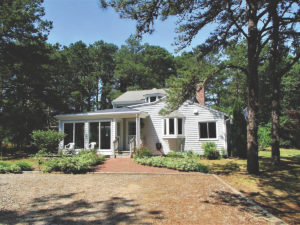A new California-based real estate company that packages one-half to one-eighth ownership shares in luxury homes is eyeing Cape Cod as part of its opening strategy, which includes 26 cities in 10 states.
Pacaso, which was launched three weeks ago by former Zillow CEO Spencer Rascoff and former CEO of Dotloop (now owned by Zillow) Austin Allison, identified Barnstable County as one of the top 20 areas in the country in terms of buyer interest, said Katie Curnutte, a company spokeswoman.
“We have no listings right now on the Cape, but there definitely will be,” she said.
The model sounds like a time-share: Buyers can purchase a half, quarter, or eighth of a home, and Pacaso offers financing options. Maintenance and property management expenses are arranged by Pacaso, which collects the funds to pay the bills without a markup. For its participation, Pacaso charges co-owners 10 percent of the initial purchase price and, annually, an additional one percent of the purchase price as a fee.
A one-eighth share gives a buyer six weeks a year.
The owners of a single home could remain completely anonymous to each other, as Pacaso handles all the furnishings, decorations, scheduling, and sales.
The difference: co-owners have equity, which is not true of time-shares. And the co-ownership is of a single home, not a condo or hotel room.
When owners sell their portion, they can earn a profit, as they would with any home in a good market, Curnutte said.
“The real comparative isn’t time-shares, it’s [with] three families who co-own a house,” she said. “They typically develop an LLC, but they have to decide who pays what, and if one wants to sell, that’s a problem for the others. If you default, the other owners are in trouble. But in this case, Pacaso would take care of the default.”
The model is meant to address that feeling that you’re wasting your investment when it stands empty 10 months a year, Curnette added.
If an owner doesn’t feel a property is being fully utilized, they could ask Pacaso to sell a portion of it. These will be high-end properties — at least double the median price of homes in the area — so, over $1 million on the Outer Cape. They must be turn-key in order for Pacaso to be interested, she said.
Potential buyers can also ask Pacaso to help find them a house, as well as partners.
“The mission is to democratize second-home ownership, which is pretty out of reach right now,” said Whitney Curry, Pacaso’s chief marketing officer.
It allows more people into the million-dollar-and-up market and could free up demand for the $500,000 and under homes for local, year-round buyers, Curnette said.
Local real estate brokers expressed skepticism.
“I like anything that brings more real estate to the market, but I’m interested in how the details work, given our short seasonal market dynamic,” said Ryan Castle, head of the Cape Cod & Islands Association of Realtors.
Co-owners will be able to reserve holidays, like Christmas and the Fourth of July, on a rotating basis so everyone gets a chance at, at least, one holiday a year. But the company has no plans to address seasonal use, Curnette said.
Fractional ownership of vacation homes is not new, Castle said. Along with the traditional time-share industry, there are companies such as Lifestyle Asset Group, which is based in Fort Collins, Colo. It’s currently offering shares in a $2.6 million Chatham home: for $515,000, the buyer gets four weeks a year, according to Lifestyle’s website. In that model, the buyers pay a one-time seven percent fee (of the purchase price) and $6,000 a year for “concierge services,” management of the property, accounting, reservations, and reciprocity with other homes — a time-share-type agreement that allows use of other resort properties, said Rich Keith, a senior partner with Lifestyle.
The property is pre-arranged to be sold in seven or eight years, which, Castle said, addresses the difficult part of fractional ownership — the exit strategy.
Castle does not think fractional ownership of luxury homes will fundamentally change the real estate market or drive up prices.
But a 2017 study showed that Airbnb and VRBO raised both rents and real estate prices and harmed the housing market for year-rounders.
Kathleen Nagle, of Kinlin Grover Real Estate, said co-ownership isn’t as attractive in practice as it sounds.
“We sell more houses that siblings or friends have bought together, and it just does not work out,” she said. “Often, parents will sell the house prior to dying, because passing it down to multiple siblings can be a problem.”

